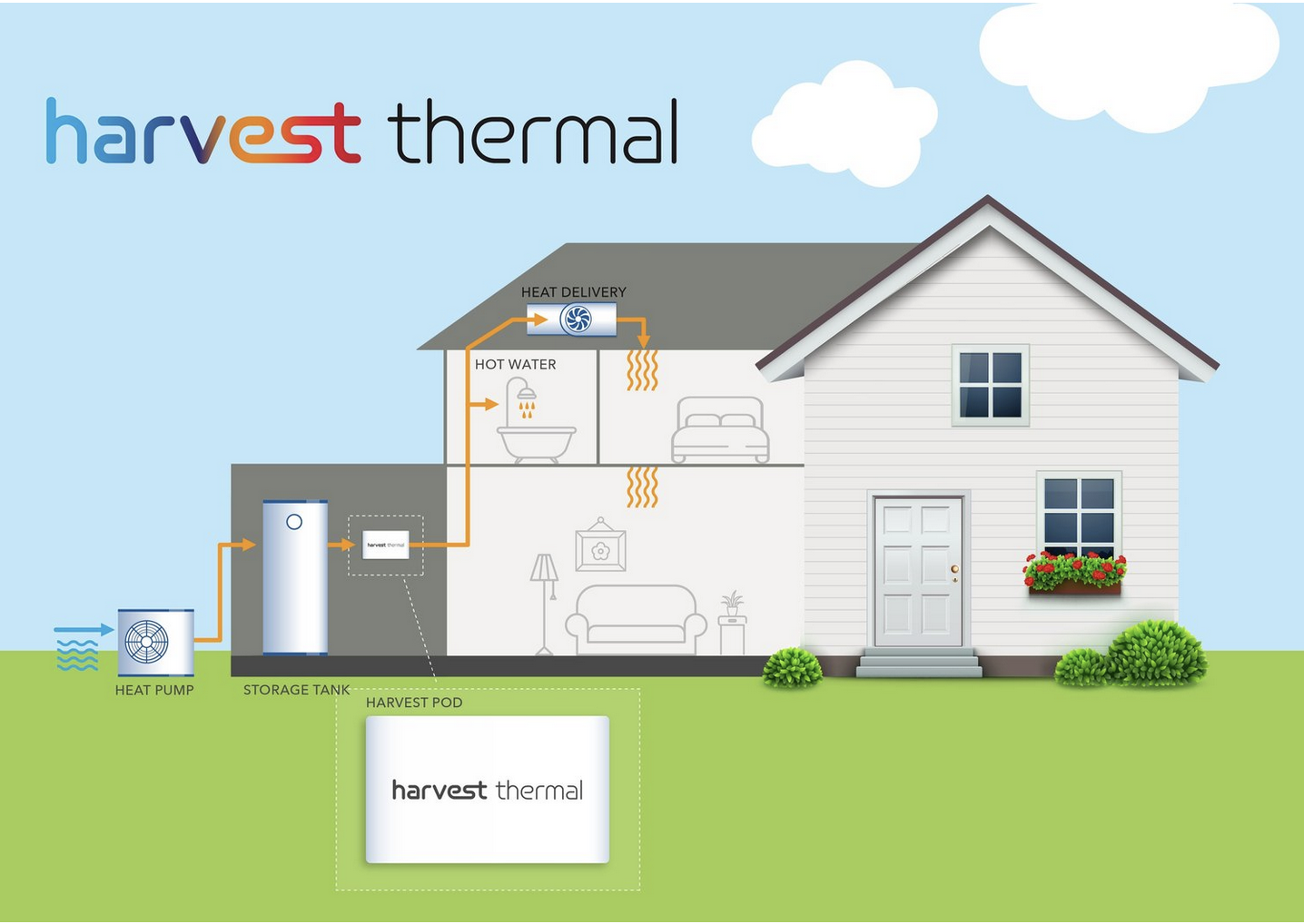Homeowner Karen Harrington Shares Harvest Thermal Experience
/Harvest Thermal uses the energy stored in your water tank to create a thermal battery for your home
Before introducing a new product like Harvest Thermal, Small Planet likes to ensure its value for our customers' energy-efficient homes. To provide more than just our endorsement, we connected with Karen Harrington, an environmental activist and the first Harvest Thermal user in the Pacific Northwest. Karen, a climate activist involved with Portland’s Climate Reality chapter and legislative efforts in Oregon, shared her insights about Harvest Thermal with Small Planet Supply’s Josh Palmer. Karen's has had first first-hand experience with Harvest Thermal, having installed it into two homes: one in Berkeley and one in Portland.
How did you originally hear about Harvest Thermal?
I was running a home tour in the 350 Bay area, and Pierre Delforge and Jane Melia volunteered their home to be on the tour. Pierre Delforge was our keynote speaker at, his speech touched on why we need to have great decarbonized homes, not just Harvest Thermal. That was an easy introduction to the community from my perspective, on what Harvest Thermal is and what the benefits are compared to a traditional heat pump system. When my husband and I found out about it, we volunteered to become a beta test site when they were ready to launch the product.
Even then it was a great system and a great process. Being a beta site, our system was constantly being tweaked. We wouldn’t have been aware of it other than Pierre tinkering in our garage. Occasionally, Pierre would say, “I hope I didn’t bother you last night, by the way.” Usually, we didn’t even know he was there. Harvest Thermal was so great to work with and so helpful, and because it was new, there were always a lot of questions. They worked closely with the contractor on everything.
Karen Harrington pictured with the Harvest Thermal system installed in her portland home
Your first Harvest Thermal was installed in Berkeley. How long did you live there for?
Altogether we spent ten years in that home. We had Harvest Thermal installed for nearly a year there before we moved. My husband would tell this as a very sad story. We had just finished everything, going all electric and getting rid of the gas meter, then we decided to move to Portland because our daughter had a baby. At that time Harvest Thermal wasn’t in the Portland area. Pierre and Jane had become our friends, and we let them know that if they started installing Harvest Thermal in the Portland area, we wanted to be the first. A year later, they said, “okay, we’re ready”.
So, would you say, that the Harvest Thermal team were really hands on and involved?
Oh my gosh, yes. Even in Oregon, we worked together with getting contractors trained and some of their staff came up since we were the first installation to make sure that it was working.
How was your home in Berkeley heated before Harvest Thermal?
It was a traditional gas furnace ducted system, and it was a big house, with three levels. We had an ADU in the bottom that was part of the home. I think we were one of their first homes that was a large size, so it took more thought in how to make it work.
From a comfort level, how did the old gas system compare with the new harvest thermal system? Was there an appreciable difference in how comfortably the home was heated?
Air handler for Harvest thermal system
Traditional gas systems, especially in a home that is over 100 years old, are heating up or they’re cooling off in a cycle. Then Harvest Thermal comes in and, because of the heat pump technology and because of their pod system, it kind of keeps everything even all the time. And because the air handler is in the garage, you don't really notice it. We used the same registers, but we did have to increase the size of the return as it was small. I suppose any kind of new HVAC system installed in a home that old, you’d have to do a lot of work. We had to replace the duct system because they had added on to the home through the years, adding a duct here and there. So, it was really convoluted, super inefficient and not insulated, of course. We really upgraded the whole system to a more modern heating system. And then once Harvest Thermal came in, we just aren't aware of it. You set the thermostat and forget about it and it's always that temperature. It's using smart technology and is very effective and it's only gotten better now. I know they use data collection now that brings in the temperature of the air and weather forecast and all those things. When our system was first installed, they didn't have all that information.
So, you had one system installed in Berkeley, and now you have a system installed in Portland. How did the installation time frame in Berkeley versus Portland compare?
It's hard to compare because Berkeley, like I said, was an old house. So there was a lot of infrastructure work besides just putting in Harvest Thermal. They also didn't have the pods yet, the compact self-contained brains of the system, back then it was all components on the wall. I always thought it looked like the console of a jet airplane. So, to try to compare how long it took here? Let's see. We were the first installation obviously for Balanced Energy Systems, that was our contractor, but I would say a week. We didn't need to put in any new ducts, and we had already done a lot of inspection as far as where it was going to go.
Okay, that's quick. It sounds like this was a first time install for the people working on it, Balanced Energy Systems, and they were just able to get in there and get it done.
Yeah, they were well trained by Harvest Thermal. Gregg Robinson, the owner of that company, is now spreading the word to contractors to get more people trained on it. There's one other company, Green Savers, also trained in the system.
California is a bit warmer than it is here in the Pacific Northwest. Did you have any concerns with installing the Harvest Thermal in a new climate zone where they hadn't had experience yet?
People have that concern just with heat pumps in general, and there's a lot of misinformation out there that they don't work when it gets cold. If you look at states like Maine though, they have a lot of heat pumps that work just fine. The Norwegian countries have a lot of heat pumps, and even Canada is installing heat pumps. It has been proven to work, and the advancement in technology and how well they're built, heat pumps are a better system than they used to be. They work fine if you make sure you get what is appropriate for cold weather. Knowing that Harvest Thermal wouldn't come here if they didn't think it was going to work, I had no concerns.
So now how long have you had the Portland system installed and how has it performed for you?
It's performing great. It was installed in September, and we had solar panels installed this summer. So, we have both of those new systems working now. We have not had any problems with it at all. You turn the thermostat on where you want it, and it stays at that temperature. It's a different experience for us now because we don't have Pierre in our garage anymore, there's not a lot of tinkering since they've got it dialed in and they've got the pod now. It’s seamless, but I kind of miss those pioneering days of “how’s this going to work and what are we going to do?”
What would you say to other homeowners considering Harvest Thermal?
Karen Harrington with Harvest Thermal Pod
Well, I would say absolutely it is the way to go, for so many reasons. One is just comfort of your home, the other is health. There’s a lot of data out there now about how dangerous gases in your home are, especially in your kitchen and nearby equipment. There was just a new report out now, and it’s kind of like with the tobacco and oil companies talking about “oh we don't see anything wrong here. There's no problem here. Look the other way” that kind of thing. When in fact, they've had the data and not been sharing it, that this is dangerous and that the emissions in your home can be very high. Now you can get all those emissions from carbon dioxide and methane out of your home if you go all electric.
If you go Harvest Thermal, you become all that more efficient. So, if you're going to do it (go all electric), why would you not lower your costs as much as possible? We do see strain on the grid as you said, and you've got this system that not only is it efficient, but it's also super smart. When it’s using energy to make hot water it’s pulling from the grid at low demand times, so it has load shifting. Then when your thermal battery kicks in is when the grid is maybe reaching its max, when maybe people are using air conditioning a lot because it's hot outside or it's just cold and the heaters are all on. Harvest Thermal has that system where it can shift that load and beyond when the grid is not so taxed. That then helps get rid of all kinds of peak emissions kinds of thing and will let up some of the need for new power plants, just a whole lot of great benefits.
I think it's a great time to go to these systems because there is some support, both in the state and federal government with IRA and Oregon just passing some great climate legislation for housing. So, it's a great time if you want to invest in the system because it's the right thing to do and it's just better for your health in your home and your efficiency and all those things, so do it now because you have a lot of support out there. The great thing about it is it's set up so that everybody can participate.
If you're considering making the switch to a system that not only provides thermal comfort and contributes to a healthier planet, consider installing Harvest Thermal. The time is now, and support is readily available.
You can explore the benefits of Harvest and learn how this system can change your life for the better by by completing the request more information form on the Harvest web page
Stay updated with the latest trends and innovations in the construction industry. Subscribe to Planet Supply’s newsletter to be notified about new blog posts and other useful information each month.












